经典古文英文翻译
古文英译:郑人买履
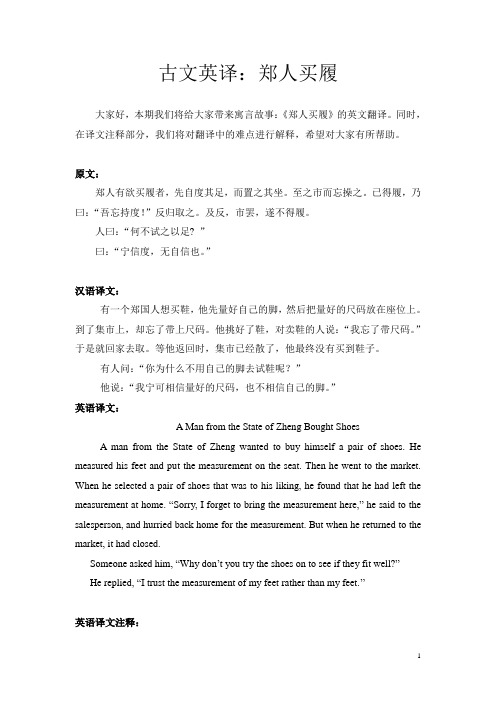
古文英译:郑人买履大家好,本期我们将给大家带来寓言故事:《郑人买履》的英文翻译。
同时,在译文注释部分,我们将对翻译中的难点进行解释,希望对大家有所帮助。
原文:郑人有欲买履者,先自度其足,而置之其坐。
至之市而忘操之。
已得履,乃曰:“吾忘持度!”反归取之。
及反,市罢,遂不得履。
人曰:“何不试之以足? ”曰:“宁信度,无自信也。
”汉语译文:有一个郑国人想买鞋,他先量好自己的脚,然后把量好的尺码放在座位上。
到了集市上,却忘了带上尺码。
他挑好了鞋,对卖鞋的人说:“我忘了带尺码。
”于是就回家去取。
等他返回时,集市已经散了,他最终没有买到鞋子。
有人问:“你为什么不用自己的脚去试鞋呢?”他说:“我宁可相信量好的尺码,也不相信自己的脚。
”英语译文:A Man from the State of Zheng Bought ShoesA man from the State of Zheng wanted to buy himself a pair of shoes. He measured his feet and put the measurement on the seat. Then he went to the market. When he selected a pair of shoes that was to his liking, he found that he had left the measurement at home. “Sorry, I forget to bring the measurement here,” he said to the salesperson, and hurried back home for the measurement. But when he returned to the market, it had closed.Someone asked him, “Why don’t you try the shoes on to see if they fit well?”He replied, “I trust the measurement of my feet rather than my feet.’’英语译文注释:1.“吾忘持度”的意思是“我忘了带尺码”,这里的“带”应该理解为“带来、拿来”,应选用bring,指从别处把某物带到说话人所在之处。
经典中国古文英语翻译

经典中国古文英语翻译但愿人长久,千里共婵娟。
We wish each other a long life so as to share the beauty of this graceful moonlight, even though miles apart.独在异乡为异客,每逢佳节倍思亲。
A lonely stranger in a strange land I am cast, I miss my family all the more on every festive day.大江东去,浪淘尽,千古风流人物。
The endless river eastward flows; with its huge waves are gone all those gallant heroes of bygone years.二人同心,其利断金。
If two people are of the same mind, their sharpness can cut through metal. 富贵不能淫,贫贱不能移,威武不能曲,此之谓大丈夫。
It is a true great man whom no money and rank can confuse, no poverty and hardship can shake, and no power and force can suffocate.海内存知己,天涯若比邻。
A bosom friend afar brings distance near.合抱之木,生于毫末,九层之台,起于累土;千里之行始于足下。
A huge tree that fills one’s arms grows from a tiny seedling; anine-storied tower rises from a heap of earth; a thousand li journey starts with the first step.祸兮,福之所依;福兮,祸之所伏。
古文观止中英对照

古文观止是中国古代文学的经典之作,其中包含了许多优秀的古文作品。
在古文观止中,有许多经典英译版本,以下是其中一些较为常见的版本:版本一:译文一:The book of ancient writings is a collection of ancient literary masterpieces. Among them are many classic English versions, some of which are quite popular.版本二:译文二:Ancient prose classic, an anthology of classic English translations, is a classic collection of ancient Chinese prose works.译文三:Ancient Chinese Classic, which includes a variety of excellent ancient Chinese prose works, has been widely translated into English.以上译文仅供参考,具体译文可能会因翻译者的翻译方法和语境而有所不同。
此外,由于古文观止中包含了许多不同的古文作品,因此这些译文可能无法涵盖所有古文作品。
此外,对于古文观止中的一些经典英译,也有一些有趣的对比和对照。
例如,《岳阳楼记》中的“不以物喜,不以己悲”这句话,可以翻译为“Not pleased by external things, nor moved by selfish desires.”或者“Not delighted by external things, nor distressed by selfish desires.”两种译法都表达了作者豁达、淡泊名利的情怀。
再如,《醉翁亭记》中的“醉翁之意不在酒,在乎山水之间也”这句话,可以翻译为“The intention of the drunken recluse is not on the wine, but in the mountains and rivers and forests.”这种译法既保留了原文的意境,又符合英语的表达习惯。
现代语翻译成古文+英文(自编)
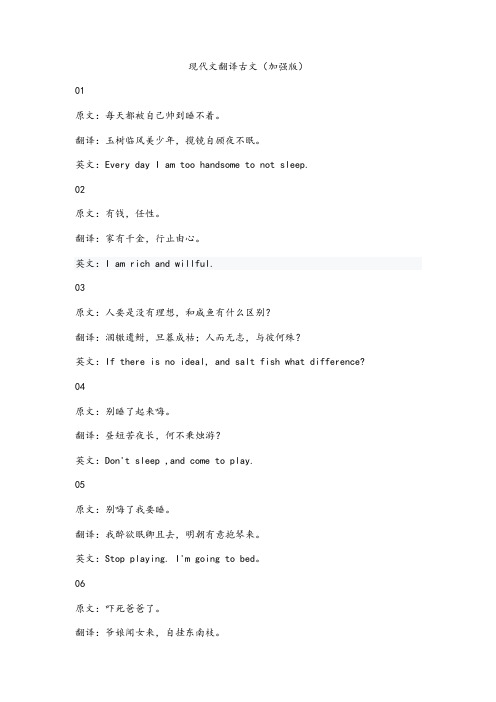
现代文翻译古文(加强版)01原文:每天都被自己帅到睡不着。
翻译:玉树临风美少年,揽镜自顾夜不眠。
英文:Every day I am too handsome to not sleep.02原文:有钱,任性。
翻译:家有千金,行止由心。
英文:I am rich and willful.03原文:人要是没有理想,和咸鱼有什么区别?翻译:涸辙遗鲋,旦暮成枯;人而无志,与彼何殊?英文:If there is no ideal, and salt fish what difference?04原文:别睡了起来嗨。
翻译:昼短苦夜长,何不秉烛游?英文:Don't sleep ,and come to play.05原文:别嗨了我要睡。
翻译:我醉欲眠卿且去,明朝有意抱琴来。
英文:Stop playing. I'm going to bed。
06原文:吓死爸爸了。
翻译:爷娘闻女来,自挂东南枝。
英文:Scared the shit out of your dad.07原文:你这么牛,家里人知道么?翻译:腰中雄剑长三尺,君家严慈知不知?英文:You're so good. Does your family know?08原文:丑的人都睡了,帅的人还醒着。
翻译:玉树立风前,驴骡正酣眠。
英文:The ugly are asleep, while the handsome are awake.09原文:主要看气质。
翻译:请君莫羡解语花,腹有诗书气自华。
英文:It is the style that matters.10原文:也是醉了。
翻译:行迈靡靡,中心如醉。
英文:I am speechless.11原文:心好累。
翻译:形若槁骸,心如死灰。
英文:My heart is so tired.12原文:我的内心几乎是崩溃的。
翻译:方寸淆乱,灵台崩摧。
英文:I almost broke down inside.原文:沉默不都是金子,有时候还是孙子。
古文英译
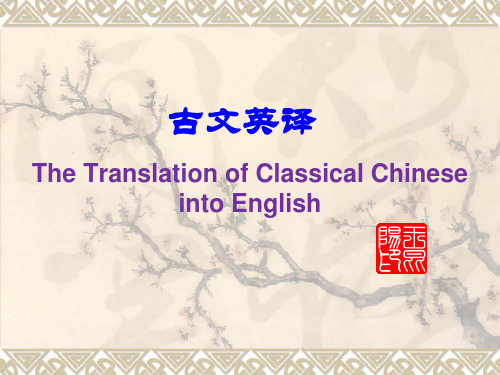
3、古今、通假和词能消长
先秦两汉古籍中通假字很多,不明通假就会误译。
请看下例:八月剥枣。(《诗经· 七月》) “剥”就是 通假字,剥者,击也。
此句许渊冲译成: In eighth moon down the dates we beat. (八月 打下大红枣。)
再比较下面两个句子中的“说”字。 (1)成事不说,遂事不谏,既往不咎。(《论语· 八 佾》)。 (2)非不说子之道,力不足也。(《论语· 雍也》)。 第1句中的“说”字古义今义相同,该句可译成: It is bootless to discuss accomplished facts, to protest against things past remedy, to find fault with bygone things. 第2句中的“说”同“悦”,不明古今就可能将 “说”字译错。理雅各译成: It is not that I do not delight in your doctrine, but my strength is insufficient.
三、汉语文言与现代英语的 比较及翻译
(一)汉语文言与现代英语句法结构的主要相似 点及其翻译 1、文言判断句与英语SVC句型 2、文言被动句与英语的被动句 (二)汉语文言与现代英语句法结构的主要差异 及其翻译 1、意合与形合 (parataxis vs. hypotaxis) 2、汉语动词优势与英语名词、介词、分词优势 3、重复与替代 (repetition vs. substitution) 4、省略与完备 (omission vs. comprehensiveness)
Limited, 1925)
中国对联,诗歌等的英文翻译
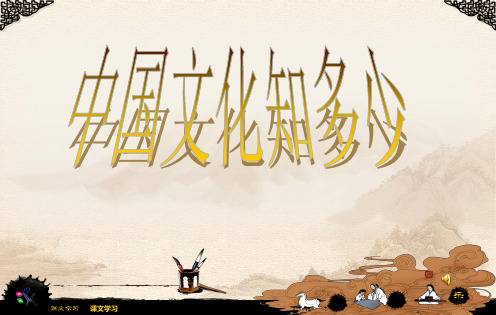
和气生财 Harmony brings wealth. 既往不咎 let bygones be bygones 脚踩两只船 sit on the fence 留得青山在不怕没柴烧 Where there is life, there is hope. • 赔了夫人又折兵 throw good money after bad • 茅塞顿开 be suddenly enlightened • 前事不忘后事之师 Past experience, if not forgotten, is a guide for the future. • • • •
课文学习
• 瑞雪兆丰年 A timely snow promises a good harvest. • 人之初性本善 Man's nature at birth is good. • 塞翁失马焉知非福 Misfortune may be an actual blessing. • 说曹操,曹操到Talk of the devil and he comes. 说曹操,曹操到Talk • 新官上任三把火a new broom sweeps clean 新官上任三把火a • 有情人终成眷属 Jack shall have Jill, all shall be well • 韬光养晦hide one's capacities and bide one's time 韬光养晦hide
课文学习
重重叠叠山, 重重叠叠山, 曲曲环环路, 曲曲环环路, 丁丁冬冬泉, 丁丁冬冬泉, 高高下下树。 高高下下树。
The hills ---- range after range ; The trails ---- winding and climbing ; The creeks ---- murmuring and gurgling ; The trees ---- high and lowly.
关于古文经典句子及翻译
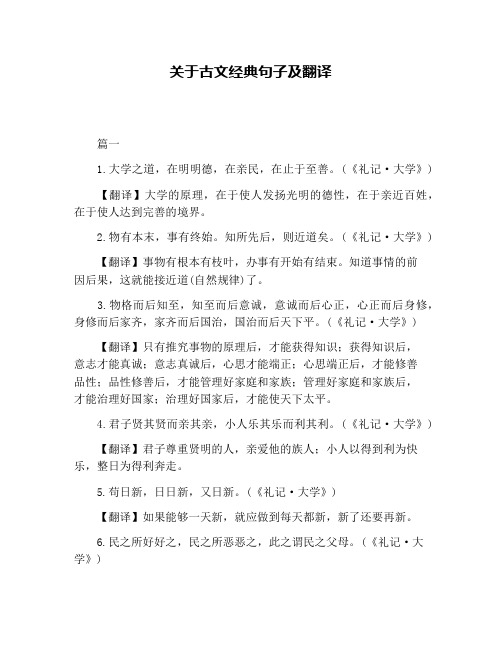
关于古文经典句子及翻译篇一1.大学之道,在明明德,在亲民,在止于至善。
(《礼记·大学》)【翻译】大学的原理,在于使人发扬光明的德性,在于亲近百姓,在于使人达到完善的境界。
2.物有本末,事有终始。
知所先后,则近道矣。
(《礼记·大学》)【翻译】事物有根本有枝叶,办事有开始有结束。
知道事情的前因后果,这就能接近道(自然规律)了。
3.物格而后知至,知至而后意诚,意诚而后心正,心正而后身修,身修而后家齐,家齐而后国治,国治而后天下平。
(《礼记·大学》)【翻译】只有推究事物的原理后,才能获得知识;获得知识后,意志才能真诚;意志真诚后,心思才能端正;心思端正后,才能修善品性;品性修善后,才能管理好家庭和家族;管理好家庭和家族后,才能治理好国家;治理好国家后,才能使天下太平。
4.君子贤其贤而亲其亲,小人乐其乐而利其利。
(《礼记·大学》)【翻译】君子尊重贤明的人,亲爱他的族人;小人以得到利为快乐,整日为得利奔走。
5.苟日新,日日新,又日新。
(《礼记·大学》)【翻译】如果能够一天新,就应做到每天都新,新了还要再新。
6.民之所好好之,民之所恶恶之,此之谓民之父母。
(《礼记·大学》)【翻译】当政者应该喜欢民众所喜欢的,应该憎恶民众所憎恶的,这就叫做百姓的父母(官)。
7.德者,本也;财者,末也。
(《礼记·大学》)【翻译】道德是根本,财富仅仅枝节。
8.所谓诚其意者,毋自欺也。
(《礼记·大学》)【翻译】所谓诚实自己的意念,就是说不要自己欺骗自己。
9.生财有大道。
生之者众,食之者寡,为之者疾,用之者舒,则财恒足矣。
(《礼记·大学》)【翻译】积聚财富有一定的道理。
生产的人要多,消费的人要少,创造财富要迅速,使用财富要缓慢。
这样,国家的财富就会经常保持充裕了。
10.子曰:“在上位,不陵下;在下位,不援上;正己而不求于人,则无怨。
上不怨天,下不尤人。
全新版八年级语文上册古文精选句子翻译英文版

全新版八年级语文上册古文精选句子翻译英文版Document Title: Selected Sentences Translation of Ancient Chinese Texts in the New Edition of Grade Eight Chinese Language Textbook1. "学而时习之,不亦说乎" - "Learning is a joy to the open mind."2. "己所不欲,勿施于人" - "Do not do to others what you do not want done to yourself."3. "知之者不如好之者,好之者不如乐之者" - "Those who know are not as good as those who love, and those who love are not as good as those who enjoy."4. "不患人之不己知,患不知人也" - "Do not worry about others not knowing you, but worry about not knowing others."5. "百闻不如一见" - "Seeing once is better than hearing a hundred times."6. "不畏浮云遮望眼" - "Do not fear the clouds that block your vision."7. "人无远虑,必有近忧" - "Without farsightedness, there will be immediate worries."9. "欲穷千里目,更上一层楼" - "To see a thousand miles, climb one more level."10. "读书破万卷,下笔如有神" - "Reading ten thousand books makes writing as if inspired by a god."。
- 1、下载文档前请自行甄别文档内容的完整性,平台不提供额外的编辑、内容补充、找答案等附加服务。
- 2、"仅部分预览"的文档,不可在线预览部分如存在完整性等问题,可反馈申请退款(可完整预览的文档不适用该条件!)。
- 3、如文档侵犯您的权益,请联系客服反馈,我们会尽快为您处理(人工客服工作时间:9:00-18:30)。
经典古文英文翻译CLASSIC LITERATURE IN ENGLISH TRANSLATION -- EXTREMELY USEFUL AND HELPFUL但愿人长久,千里共婵娟。
We wish each other a long life so as to share the beauty of this graceful moonlight, even though miles apart.独在异乡为异客,每逢佳节倍思亲。
A lonely stranger in a strange land I am cast, I miss my family all the more on every festive day.大江东去,浪淘尽,千古风流人物。
The endless river eastward flows; with its huge waves are gone all those gallant heroes of bygone years.二人同心,其利断金。
If two people are of the same mind, their sharpness can cut through metal.富贵不能淫,贫贱不能移,威武不能曲,此之谓大丈夫。
It is a true great man whom no money and rank can confuse, no poverty and hardship can shake, and no power and force can suffocate.海内存知己,天涯若比邻。
A bosom friend afar brings distance near.合抱之木,生于毫末,九层之台,起于累土;千里之行始于足下。
A huge tree that fills one’s arms grows from a tiny seedling; a nine-storied tower rises from a heap of earth; a thousand li journey starts with the first step.祸兮,福之所依;福兮,祸之所伏。
Misfortune, that is where happiness depends; happiness, that is where misfortune underlies.见贤思齐焉,见不贤而内自省也。
On seeing a man of virtue, try to become his equal; on seeing a man without virtue, examine yourself not to have the same defects.江山如此多娇,引无数英雄尽折腰。
This land so rich in beauty has made countless heroes bow in homage.举头望明月,低头思故乡。
Raising my head, I see the moon so bright; withdrawing my eyes, my nostalgia comes around.俱往矣,数风流人物,还看今朝。
All are past and gone; we look to this age for truly great men.君子成人之美,不成人之恶。
The gentleman helps others to achieve their moral perfection but not their evil conduct.君子独立不惭于影,独寝不愧于魂。
A righteous man never feels ashamed to face his shadow when standing alone and to face his soul when sleeping alone. 君子之交淡如水,小人之交甘如醴。
君子淡以亲,小人甘以绝。
The friendship between men of virtue is light like water, yet affectionate; the friendship between men without virtue is sweet like wine, yet easily broken.老吾老以及人之老,幼吾幼以及人之幼。
Expend the respect of the aged in one’s family to that of other families; expend the love of the young ones in one’s fa mily to that of other families.礼尚往来。
往而不来,非礼也;来而不往,亦非礼也。
Propriety suggests reciprocity. It is not propriety not to give out but to receive, or vice versa.两情若是长久时,又岂在朝朝暮暮。
If love between both sides can last for aye, why need they stay together night and day?路漫漫其修远兮,吾将上下而求索。
The w ay ahead is long; I see no ending, yet high and low I’ll search with my will unbending.民为贵,社稷次之,君为轻。
The people are the most important element in a state; next are the gods of land and grain; least is the ruler himself.千丈之堤,以蝼蚁之穴溃;百尺之屋,以突隙之烟焚。
A long dike will collapse because of an ant-hole in it; a tall building will be burned down by a spark from a chimney’s chink.锲而舍之,朽木不折,锲而不舍,金石可镂。
Carve but give up half way, even a decayed piece of wood will not break; carve without stop, even metal and stone can be engraved.人有悲欢离合,月有阴晴阳缺,此事古难全。
People have sorrow and joy; they part and meet again. The moon dims or shines; it waxes or wanes. Nothing is perfect, not even in the olden days.人之于文学也,犹玉之于琢磨也。
Learning and culture are to a person what polished and grinding are to jade.三人行,必有我师焉。
择其善者而从之,其不善者而改之。
Among any three people walking, I will find something to learn for sure. Their good qualities are to be followed, and their shortcomings are to be avoided.士不可以不弘毅,任重而道远。
仁以为己任,不亦重乎?死而后己,不亦远乎?An educated gentleman cannot but be resolute and broad-minded, for he has taken up a heavy responsibility and a long course. Is it not a heavy responsibility, which is to practice benevolence? Is it not a long course, which will end only with his death?士之为人,当理不避其难,临患忘利,遗生行义,视死如归。
A moral intellectual is one who escapes no danger in face of truth, discards personal interests in front of disaster, practices righteousness at the expense of life, and looks upon death as going home.逝者如斯夫!不舍昼夜。
The passage of time is just like the flow of water, which goes on day and night.顺天者存,逆天者亡。
Those who follow the Heaven’s law will survive; those who go against it will perish.天将降大任于斯人也,必先苦其心志,劳其筋骨,饿其体肤,空乏其身,行拂乱其所为,所以动心忍性,增益其所不能。
When Heaven is about to place a great responsibility on a great man, it always first frustrates his spirit and will, exhausts his muscles and bones, exposes him to starvation and poverty, harasses him by troubles and setbacks so as to stimulate his spirit, toughen his nature and enhance his abilities.天生我才必有用。
Heaven has endowed me with talents for eventual use.天时不如地利,地利不如人和。
Opportunities vouchsafed by Heaven are less important than terrestrial advantages, which in turn are less important than the unity among people.天行健,君子以自强不息。
